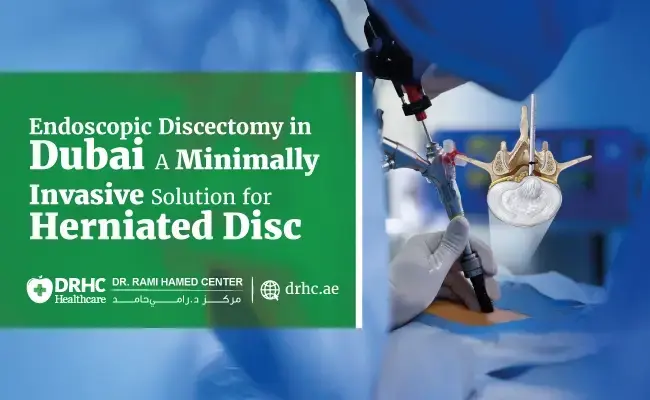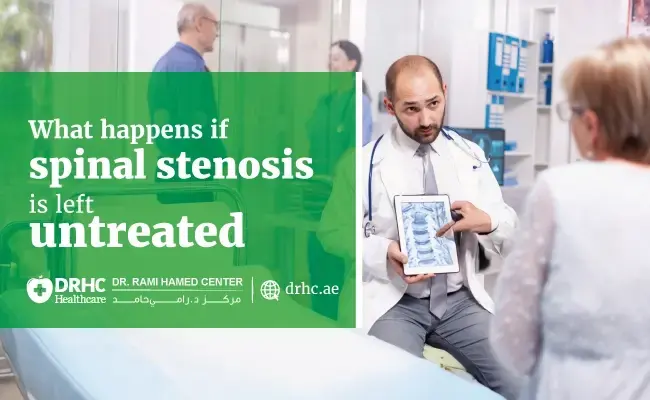
Many people are surprised to learn that a slipped disc — also called a herniated or prolapsed disc — can exist without causing any pain at all. In fact, some patients discover they have a slipped disc only when undergoing an MRI for an unrelated issue.
At Dr. Rami Hamed Center (DRHC) in Dubai, we often see patients who are confused and even anxious after such a finding. If you’ve been told you have a slipped disc but feel fine, or if you’re trying to understand why some discs cause severe pain while others don’t, this guide will help clarify the difference.
Understanding a Slipped Disc
Between each bone (vertebra) in your spine lies a disc — a soft cushion with a jelly-like center (nucleus pulposus) surrounded by a tougher outer ring (annulus fibrosus).
A slipped disc occurs when the inner material pushes out through a tear or weakness in the outer ring. This can happen from:
- Natural ageing and disc wear
- Repetitive strain or poor posture
- Sudden heavy lifting or twisting
- Spine injuries
Why a Slipped Disc May Not Cause Symptoms
A disc herniation becomes a problem when it affects nearby nerves or the spinal cord. If the bulging portion doesn’t touch or irritate nerves, you may have no symptoms at all.
Some reasons a slipped disc might stay “silent” include:
- No nerve compression — The herniation occurs in an area where it doesn’t press on sensitive nerve tissue.
- Minimal inflammation — Without swelling or chemical irritation, the nerve may remain unaffected.
- Gradual changes — The body sometimes adapts to slow disc changes without triggering pain signals.
When Symptoms Do Appear
If the herniated disc presses on or inflames a nerve, symptoms can range from mild to severe. These may include:
- Localised back or neck pain
- Pain radiating into the arm (cervical spine) or leg (lumbar spine)
- Numbness, tingling, or “pins and needles”
- Muscle weakness in the arms or legs
- Difficulty with certain movements or positions
In rare but serious cases, severe nerve compression can lead to loss of bladder or bowel control — a medical emergency requiring immediate attention.
How We Diagnose and Treat at DRHC Dubai
At Dr. Rami Hamed Center, we use a combination of medical history, physical examination, and imaging (MRI or CT scans) to determine:
- If a slipped disc is present
- Whether it is causing your symptoms
- The best course of treatment
Treatment options depend on your condition:
- Observation — If there are no symptoms, we may simply monitor the disc over time.
- Physiotherapy — Exercises to strengthen the spine and improve flexibility.
- Pain management — Medications or targeted injections to reduce inflammation.
- Minimally invasive surgery — Only when symptoms are severe or persistent despite conservative treatment.
We understand that surgery can feel overwhelming. That’s why we only recommend it when necessary, and we use techniques that aim for the quickest and safest recovery possible.
Explore Our Related Blogs
- How spinal alignment issues cause chronic neck pain
- How poor ergonomics can trigger cervical disc herniation
- How long-standing disc bulges lead to foraminal narrowing
- How lifting injuries trigger annular tears and disc prolapse
FAQs About Slipped Discs and Symptoms
1. Can a symptom-free disc suddenly start causing pain?
Yes. New strain, injury, or inflammation can trigger symptoms even after years without pain.
2. Should a painless slipped disc be treated?
If it’s not causing symptoms, active treatment is usually unnecessary — but periodic monitoring is advised.
3. Can physiotherapy help even if I have no pain?
Yes. Strengthening and posture work can help prevent future flare-ups.
4. How long does it take for a slipped disc to heal?
Mild cases may improve in weeks to months; some herniations shrink naturally over time.
5. Can I continue normal activities with a slipped disc?
Yes, as long as it’s pain-free — but lifting heavy objects or extreme movements should be avoided without guidance.
The Bottom Line
A slipped disc is not always a cause for alarm — many people live with one without even knowing it. The key is to recognise when it is causing symptoms and to seek timely, professional advice.
If you’re in Dubai and have been diagnosed with a slipped disc — with or without pain — the specialists at DRHC Dubai can provide a thorough evaluation, personalised recommendations, and, if needed, targeted treatment to keep your spine healthy.
Dr. Rami Hamed
Consultant Spine & Orthopedic Surgeon
Founder, DRHC – Dubai Healthcare City
📞 +971 4 279 8800
🌐 www.drhc.ae
📍 Dubai Healthcare City, Building 52
Topic: orthopedic Spine Surgery




.jpg)




Leave a comment